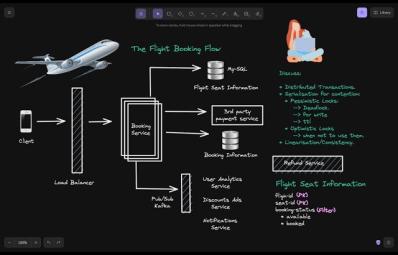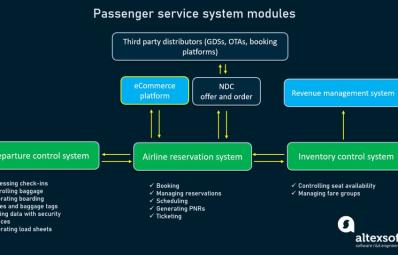Posted At: Mar 03, 2025 - 996 Views

Introduction
A robust Database Management System (DBMS) is essential for airline reservation systems due to high transaction volumes, real-time processing, and global accessibility. Given these requirements, a distributed DBMS is the ideal choice, ensuring high availability, scalability, and fault tolerance (Bibi, 2021).
This discussion explores why a distributed DBMS outperforms centralized and client-server models, providing a scalable and resilient infrastructure for airline ticketing applications.
🚀 Download the Full Discussion (PDF): Click Here
1. Why a Distributed DBMS is the Best Choice for Airline Reservations
📌 Key Insight: A distributed system improves system stability, transaction speed, and user experience.
🔹 Benefits of a Distributed DBMS:
✔ High Availability: The system operates on multiple servers worldwide, reducing downtime risks.
✔ Scalability: Additional servers can be integrated easily, ensuring consistent performance even during peak travel seasons.
✔ Reduced Latency: Users interact with local servers, improving response time for bookings and ticketing.
🔹 Real-World Application:
✔ Airline bookings involve simultaneous transactions globally, requiring a high-speed, scalable system.
✔ A distributed DBMS balances the load, preventing system slowdowns and failures during high traffic periods.
💡 Takeaway: A distributed DBMS enhances system reliability and transaction efficiency, making it the best choice for airline reservations.
2. Why Centralized & Client-Server DBMS Models Fall Short
📌 Key Insight: Traditional architectures lead to bottlenecks, downtime risks, and scalability limitations.
🔹 Challenges of a Centralized DBMS:
✔ All transactions rely on a single server, leading to performance bottlenecks.
✔ If the central server fails, the entire system becomes inaccessible, resulting in financial losses and customer dissatisfaction.
🔹 Client-Server Architecture Limitations (Kumar, 2022):
✔ While more scalable than a centralized system, it still depends heavily on a single primary server.
✔ Increases downtime risks and affects performance compared to a fully distributed model.
💡 Strategic Takeaway: A distributed DBMS eliminates single points of failure, ensuring continuous availability and seamless scalability.
3. Case Studies: How Airlines Benefit from a Distributed DBMS
📌 Key Insight: Research highlights the advantages of distributed DBMS in high-demand airline systems.
🔹 Findings from Bibi (2021) & Kumar (2022):
✔ Distributed DBMS enables faster transactions and improved system efficiency.
✔ Airlines using distributed architecture experience fewer system failures during peak seasons.
✔ Scalability & fault tolerance reduce risks of transaction delays and performance bottlenecks.
💡 Policy Insight: A distributed DBMS ensures operational continuity, making it ideal for high-traffic, global applications like airline reservations.
4. Practical Implementation Strategies for a Distributed DBMS
✔ Cloud-Based Infrastructure: Supports real-time data synchronization and global accessibility.
✔ Load Balancing Mechanisms: Distributes traffic efficiently across multiple server nodes.
✔ Automated Failover Solutions: Ensures redundancy to prevent system crashes and data loss.
💡 Best Practice: Investing in a distributed DBMS future-proofs airline reservation systems, ensuring reliability and operational efficiency.
Conclusion
A distributed DBMS is the best architecture for airline reservation systems, ensuring high availability, scalability, and minimal downtime. Unlike centralized and client-server models, a distributed system enhances transaction speed, fault tolerance, and real-time data processing—making it essential for global airline operations.
📥 Download Full Discussion (PDF): Click Here
Related Database Management & System Architecture Resources 📚
🔹 The Future of Distributed Databases in Enterprise Systems
🔹 How DBMS Scalability Impacts Business Operations
🔹 Cloud-Based vs. On-Premise Database Solutions: Pros & Cons
📌 Need expert insights on database architecture? 🚀 Our professional writers at Highlander Writers can assist with DBMS research, system design analysis, and IT case studies!
Leave a comment
Your email address will not be published. Required fields are marked *










